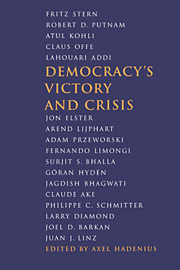Book contents
- Frontmatter
- Contents
- List of contributors
- Acknowledgments
- 1 Victory and crisis: introduction
- Part 1 Historical perspectives
- Part 2 Social and cultural aspects
- 3 Democracy in America at century's end
- 4 On sources of social and political conflicts in follower democracies
- 5 Micro-aspects of democratic theory: what makes for the deliberative competence of citizens
- 6 Political Islam and democracy: the case of Algeria
- Part 3 Constitutional questions
- Part 4 Democracy and development
- Part 5 Democracy and globalization
- Part 6 Promoting democracy
- Index
6 - Political Islam and democracy: the case of Algeria
Published online by Cambridge University Press: 13 October 2009
- Frontmatter
- Contents
- List of contributors
- Acknowledgments
- 1 Victory and crisis: introduction
- Part 1 Historical perspectives
- Part 2 Social and cultural aspects
- 3 Democracy in America at century's end
- 4 On sources of social and political conflicts in follower democracies
- 5 Micro-aspects of democratic theory: what makes for the deliberative competence of citizens
- 6 Political Islam and democracy: the case of Algeria
- Part 3 Constitutional questions
- Part 4 Democracy and development
- Part 5 Democracy and globalization
- Part 6 Promoting democracy
- Index
Summary
The majority of political scientists studying democratization in the Third World avoid Muslim countries due to the difficulty posed by Islam religion which is intricately linked to politics. Indeed, analysis of the relationship between Islam and democracy is only speculative when separated from historical experience. As a religion, Islam does not take sides for or against democracy. The importance for this discussion is the human interpretation of religion in relation to political conflicts. I will deal with the issue of Islam and democracy throughout the Algerian experience from this perspective.
The bid for democratization made by Algeria between 1989 and 1992 is of interest, for it sought to combine two features. The country was (a) trying to free itself from an authoritarian regime, while (b) remaining Muslim at the same time. Following violent riots in October 1988, Algeria adopted a multiparty system, and in February 1989, a constitution institutionalizing the contest for power came into force. As a result of this constitution, some sixty political parties emerged; one of these, however, demonstrated an imposing strength at once – both for the number of its militants, and for the favorable response it met on the part of the working classes. Indeed, in June 1990, the Islamic Salvation Front (ISF) swept the local elections and won control of 55 percent of the local councils, and was in the lead following the first round of voting in the general election of December 1991. The army responded by canceling the second ballot, thus putting an end to the process of democratization, which had only lasted three years.
- Type
- Chapter
- Information
- Democracy's Victory and Crisis , pp. 105 - 120Publisher: Cambridge University PressPrint publication year: 1997
- 2
- Cited by



